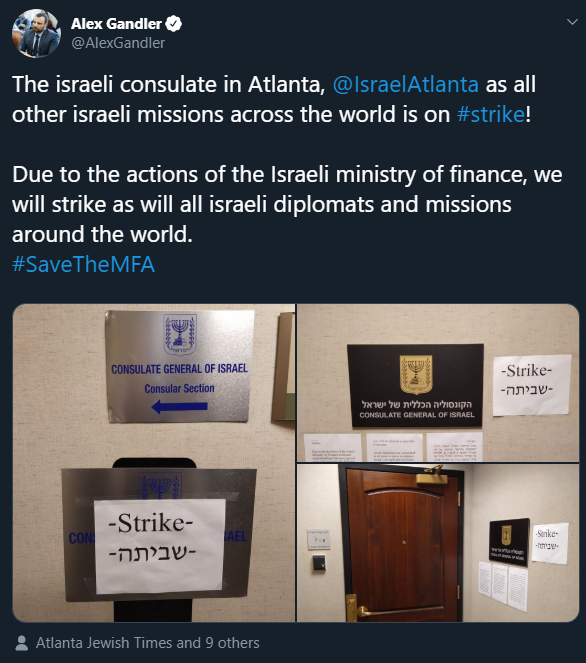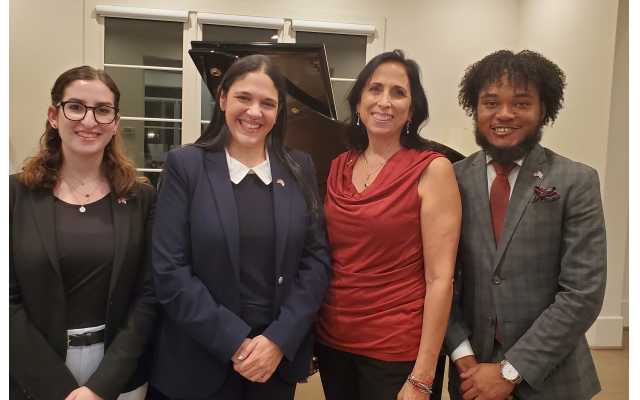Welcoming Our New Consul Amid Strike Concerns
As Atlanta welcomed Anat Sultan-Dadon and her team, Israeli diplomats around the world began striking in response to a Ministry of Finance decision.
Israel’s new Consul General to the Southeast Anat Sultan-Dadon is settling into life in Atlanta. She held a reception Oct. 29 for nearly 100 of Jewish Atlanta’s spiritual and community leaders. The event was a chance to get to know a little more about the diplomats serving the Southeast while snacking on kosher desserts.
As part of the event, Sultan-Dadon took questions from those in attendance, with topics ranging from her first impressions of Atlanta’s Jewish community to the pending Israeli diplomatic strike.
She began by complimenting Jewish Atlanta and how active it is.
“It really is our most important asset,” she said. “Of course, one of our most important tasks anywhere in the world is to maintain and nurture a strong relationship with the Jewish community. … It is also an incredible asset as we go about our daily work because so many of you are part of many different circles, whether it’s our political work, economic work or academic work.”
Asked to address her biggest bullet points for her first few years in the Southeast, she said, “Our goals are something we try to define even before we arrive in the position. It serves as the best compass to direct our work.”
She noted that while the seven states her consulate covers currently have strong relationships with Israel, it would be important to ensure that remains steady in the future by working with both Republicans and Democrats.

Delilah and Steve Cohen hosted the event in their home.
“It was important to Steven and me to bring together leaders from different Jewish organizations, synagogues and schools to enjoy themselves in an informal setting and have the opportunity to meet the new face of Israel, Consul General Anat Sultan-Dadon. This gathering represented that we are all one Jewish community in Atlanta in strong support of Israel, and as an Israeli, I know the value of that support, which can never be taken for granted.”
As the event was taking place, Israeli consulates around the world were preparing to strike, shutting down consulate services in protest of a Ministry of Finance decision that would — according to diplomats — have an adverse effect on Ministry of Foreign Affairs staffers.
In the past, diplomats have been afforded lump-sum stipends to cover their expenses, both personal and official. Now, the Ministry of Finance is asking for receipts in order to reimburse payments, and also demanding that officials pay Israeli sales tax on personal expenses. That value added tax is 17 percent.
“Foreign Ministry employees are required to pay taxes like every other citizen of the state of Israel,” the Ministry of Finance said in a statement. “It’s a shame that, in an attempt to improve their circumstances, Foreign Ministry employees are refusing to pay taxes and are hindering essential services. Foreign Ministry employees are not above the law.”
Deputy Consul General to the Southeast Alex Gandler spoke to the AJT about the strike and why it goes beyond one simple rule change.

“The strike itself was about reimbursement for work-related events and expenses,” he said. “But it’s also about the role of the Ministry of Foreign Affairs and the way the Ministry of Finance is treating the diplomatic corps in Israel.”
At the reception, Sultan-Dadon was asked about the effect this change has had on her consulate’s ability to work.
“It means that we cannot do any traveling,” she said. “We cover a territory of seven states and that is very significant. I arrived and had an opportunity to quickly [travel] a bit, but it wasn’t nearly enough, and the ability to meet people where they are is essential to our work. I hope our political situation will be different in the near future.”
The strike began the morning of Oct. 30 in Israel and is temporarily paused because of an injunction that asked both sides to take a month to try to settle the dispute.
“We’re going to sit down and hopefully have a productive discussion,” Gandler said. “But one of the reasons we went on strike was that we already had an agreement, … and just before the holidays started, the Ministry of Finance went back on that agreement.”
At the core of the matter is the identity of the Ministry of Foreign Affairs, according to Gandler.
“There cannot be a sovereign country without a Ministry of Foreign Affairs,” he said. “I’m optimistic that eventually we will agree on conditions, … but we’re fighting for the positions of the ministry. It’s a discussion about Israeli defense and Israeli foreign relations, which go hand-in-hand.”




comments